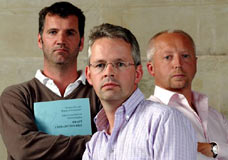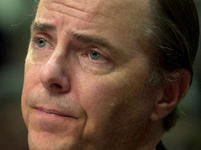 In the universe of unjust Enron-related criminal prosecutions, the NatWest Three case was particularly pernicious.
In the universe of unjust Enron-related criminal prosecutions, the NatWest Three case was particularly pernicious.
Three bankers from the United Kindom, who did nothing other than to have the misfortune of entering into a deal with the CFO of one of the largest public corporations in the U.S., were indicted by a federal grand jury in Houston, uprooted from their jobs and homes in the U.K., extradited to the U.S. under a post-9/11 law that was enacted to facilitate the extradition of terrorists, and forced to endure a four-year ordeal before they were able to return home to their families in the U.K. Two of the NatWest Three — David Bermingham and Gary Mulgrew — describe the barbaric treatment that they experienced in this series of interviews on the Ungagged.Net website.
Now safely back in the U.K., Bermingham is trying to do something constructive with his horrifying experience — that is, change the absurd U.K. statute that allowed the U.S. to extradite Bermingham and his colleagues without even the protection of an evidentiary hearing in the U.K. to determine whether there was evidence of a true crime.
Below is Bermingham’s testimony before the Joint Committee of Human Rights in the U.K. Not only does he provide a lucid and compelling argument for modification of the extradition statute, he also touches on several of the troubling aspects of the U.S. criminal justice system that have been often discussed here, such as draconian plea bargains, prosecutorial misconduct, witness intimidation, and the trial penalty, just to touch on a few.
After watching this video, ask yourself this question — just how have we gotten to the point where we are wasting our governmental resources on prosecuting people such as Bermingham?
Monthly Archives: February 2011
A Self-Righteous Delusion
 So, the Wall Street Journal is reporting that a court aide to the judge in the trial of former OAO Yukos chairman and CEO Mikhail Khodorkovsky has admitted that the judge was forced to render a verdict in the case that was different from the one that he had drafted.
So, the Wall Street Journal is reporting that a court aide to the judge in the trial of former OAO Yukos chairman and CEO Mikhail Khodorkovsky has admitted that the judge was forced to render a verdict in the case that was different from the one that he had drafted.
As the WSJ article notes righteously:
“Everyone in the judicial community understands perfectly that this is a rigged case, a fixed trial,” said [the aide],adding that she had decided to go public with her allegations because she had become disillusioned with the judicial system.
[The aide’s] claims support the widespread view that the latest trial of Mr. Khodorkovsky, once Russia’s richest man and the former owner of oil giant OAO Yukos, was politically motivated. Kremlin officials have repeatedly denied those allegations.
But courts in several countries in Europe have ruled in related cases that the prosecution of Mr. Khodorkovsky and the court-ordered breakup of Yukos appeared driven by the Kremlin’s desire to scotch Mr. Khodorkovsky’s political ambitions and nationalize his company.
Bad stuff, indeed.
However, is what happened to Khodorkovsky really all that much different than what happened to former Enron CEO Jeff Skilling right here in the good ol’ USA? At least Khodorkovsky is scheduled to be released from prison in 2017. Skilling is currently scheduled to be released around 2030!
And let’s just say that the WSJ was a healthy tad less righteous in its reporting on the misconduct that took place in Skilling’s trial than it is with regard to the hijinks that went on in Khodorkovsky’s.
Frankly, I don’t know what is sadder. That the Skilling case makes the U.S. justice system look much like the kangaroo court that convicted Khodorkovsky in Russia, or that the U.S.’s leading business newspaper still doesn’t recognize the similarity.
Challenging that entertaining form of corruption
 All the talk in the sports world these days seems to revolve around the impending lock-out of NFL players by the NFL owners.
All the talk in the sports world these days seems to revolve around the impending lock-out of NFL players by the NFL owners.
However, this Antonio Irzarry/Sports in the Courts Blog post reports on Ed O’Bannon’s class action lawsuit against the NCAA, which might just end up being more interesting and change-provoking than anything that occurs in the current NFL labor negotiations:
As noted many times over the years, big-time college sports under the rubric of NCAA regulation is shamefully corrupt. Granted, it’s an entertaining form of corruption, but corrupt nonetheless.
There is simply no reason why gifted young football and basketball players should be prevented from earning compensation for the entertainment and wealth that they create in the same manner that young golfers and tennis players do.
It is far past time for the NCAA member institutions to abandon the NCAA’s obsolescent regulatory system and adopt one that recognizes and rewards the risks that the players take — and the contributions that they make – in providing entertainment and creating wealth.
Let’s face it – paying indirect compensation to professional athletes in the form of academic scholarships and flashy resort facilities just doesn’t cut it anymore.
Let the market sort out the institutions that are willing to take the risk of investing in what amount to upper minor-league football and basketball teams. The top 30-50 programs will probably do so, but most institutions outside of that group will not. Why risk losing even more money than most programs are under the present system?
Who knows? Perhaps the institutions that elect not to sponsor professional teams will decide to engage in true inter-collegiate competition between real student-athletes.
And with no need for the embarrassing hyprocrisy that the NCAA represents.
Preventing what?
 My father was a master diagnostician who had an uncanny knack – honed over many years of personally examining and interviewing patients – of making the correct diagnosis of a patient’s medical problem without the assistance of expensive and often time-consuming tests.
My father was a master diagnostician who had an uncanny knack – honed over many years of personally examining and interviewing patients – of making the correct diagnosis of a patient’s medical problem without the assistance of expensive and often time-consuming tests.
However, my father’s way is not the preferred method of modern preventative care, which often tethers patients to their doctors with a dizzying array of tests.
Dr. H. Gilbert Welch and his colleagues at the Dartmouth School of Medicine aren’t convinced that the modern way is better than my father’s approach. This Abigal Zuger, MD/NY Times review of Dr. Welch’s new book – Over-diagnosed: Making People Sick in the Pursuit of Health (Beacon Press January 18, 2011) — sums up the core issue well:
As the world is currently configured, the authors point out, doctors are never punished for over-diagnosis, no matter how much havoc may be wrought by untrammeled over-testing. It is perceived under-diagnosis that arouses legal and moral wrath.
Is that the way it should be?
An intriguing question, indeed!
The NFL Bubble
 Earlier posts here and here noted the real possibility that the problems that the Harris County Sports Authority is currently experiencing in paying the debt incurred in the construction of various stadiums in Houston may be a sign of a bubble in the professional sports business that is about to burst.
Earlier posts here and here noted the real possibility that the problems that the Harris County Sports Authority is currently experiencing in paying the debt incurred in the construction of various stadiums in Houston may be a sign of a bubble in the professional sports business that is about to burst.
S. M. Olivia of the Ludwig von Mises Institute picks up on that theme in analyzing the very real possibility that National Football League owners may elect to lock-out NFL players because of stalled negotiations over a new collective bargaining agreement:
The NFL encapsulates, perhaps better than any other single business entity, the popular conceptions — and misconceptions — about capitalism and the nature of markets. The league is the epitome of statist “crony” capitalism. Its franchise operators demand huge government subsidies for stadiums while jealously guarding its prerogatives as a “private” business. Governments (and their media enablers) largely go along with this because they’ve been led to believe the NFL’s popularity is so immense that no respectable city can go without a franchise.
Professional football is the ethanol of the entertainment industry. Since 1990, nearly every NFL franchise has either opened a new stadium, made substantial renovations to existing stadiums, or is currently in the process of obtaining a new stadium. Over this 20-year period the league’s franchises obtained over $7 billion in taxpayer subsidies raging from direct taxes to publicly backed bonds. Ten stadiums are 100% government-financed, while another 19 are at least 75% government-financed. Every single franchise receives some amount of government subsidies. [ . . .]
[The ongoing NFL-NFLPA dispute is] . . . simple really: The owners overspent on unnecessary stadiums, and now they want the players to work more for less pay to help pay down the debt. That’s your entire labor dispute in one sentence. The league expects — nay, demand — the NFLPA to act like a local government in a stadium dispute and simply give the franchise operators what they want for little or nothing in return. Maintaining the “owners'” social standing is of paramount importance. [ . . .]
The NFL produces three things: stadium debt, intellectual property, and bureaucracy. None of these things should be confused with “free market” values. The league is a prime example of what happens when you mix politically influential egos with easy credit and a media environment that largely promotes economic ignorance. You have the perfect boom business.
But all booms eventually end. NFL acolytes — and they are presently the majority — will insist, as Homer Simpson once did, that “everything lasts forever.” One media writer I correspond with insisted to me recently the NFL will be even more popular in 20 years then it is today. Go back to 1991 and think about all of the businesses you could have said that about, incorrectly, at that time.
That’s not to say professional football will cease to exist, nor even that the present labor situation will yield some disaster beyond imagination. What I am saying is that all the positive, pie-in-the-sky press in the world can’t alter economic reality. The NFL isn’t just a house of cards. It’s a house of cards built atop a pile of toxic waste. The only thing keeping the house from sinking is a support structure composed of television contracts.
But the networks face their own economic challenges, and unless you can guarantee that Fox, ESPN, CBS, et al., will be stronger then they are now in 2031, then you can’t say with any confidence the NFL will survive and thrive indefinitely. The league is built on consumption, and when you adopt that model, eventually you’ll eat yourself out of your $1.3 billion house and home.
My sense is that the NFL owners will endure a public relations debacle if they force a work stoppage, particularly if they allow it to last a long time.
For one thing, the entertainment market is far different and more diverse now than it was during prior NFL work stoppages. Thus, the market for entertainment has many alternatives to the NFL.
Moreover, the market appreciates the grave injury risk that the players endure far better than it did during prior NFL work stoppages. The public is unlikely to side with wealthy owners who are attempting to force players to take more economic risk in the face of that injury risk.
Funny thing about those financial bubbles – they are far easier to see in hindsight.
Another Like You
Clear Thinkers favorite Hayes Carll — a native of the Woodlands — is the latest in Texas’ long line of talented singer/songwriters such as Willie Nelson, Townes Van Zandt, Guy Clark, Steve Earle, Ray Wylie Hubbard, Robert Earl Keen and Lyle Lovett.
Carll has just come out with a new album, KMAG YOYO (and other American Stories). The following is a catchy duet from the new album called “Another Like You.” Enjoy!
The Greatest Walk in Golf
The walk from the 15th green to the 16th tee of Cypress Point Golf Club on the Monterey Peninsula in Northern California.
Be more efficient at work . . .
In our continuing series of innovation commercials, check out this one from Norway. Outstanding!
Dissecting Tiger’s swing problems
 I’m partial to Jeff Ritter’s take, but the Somax Performance analysis (H/T Geoff Shackelford) below of Tiger Wood’s swing problems is thought-provoking.
I’m partial to Jeff Ritter’s take, but the Somax Performance analysis (H/T Geoff Shackelford) below of Tiger Wood’s swing problems is thought-provoking.
As an aside, I continue to maintain that Wood’s ill-advised training regimen has had an underappreciated impact on his swing problems.
Narcotic maintenance vs. Addiction
 This recent WaPo article highlights one of the senseless incongruities of the U.S.’s dubious policy of drug prohibition:
This recent WaPo article highlights one of the senseless incongruities of the U.S.’s dubious policy of drug prohibition:
Twice, the patient, a man in his mid-30s, said he lost his prescriptions for Valium and Percocet. Once, he said he was in a car accident that scattered his pills on the road. Another time, he said the medicine he was first prescribed was no good, so he “returned the pills.” Another time, his wife called and said their house had been “searched by authorities” and the medicine had gone missing.
Each time, no matter the story, Peter S. Trent or Hampton J. Jackson Jr., doctors at the same orthopedic practice in Oxon Hill, refilled the prescription, according to the Maryland Board of Physicians. Over the course of 21/2 years, the doctors gave the patient 275 prescriptions, mostly for Percocet, a powerful, highly addictive painkiller.
Sometimes they wrote the patient more than one prescription for the drug on the same day. In a single month, they wrote him 11 prescriptions for Percocet, totaling 734 pills.
On one hand, maybe the patients had a “legitimate” need for large amounts of narcotics, but most doctors wouldn’t write prescriptions for the drugs because they fear prosecution if they did so.
On the other hand, the patients may be addicts without a “legitimate” need for the drugs, but they seek to obtain the narcotics through prescription because it is safer and probably cheaper than buying them illegally.
Current U.S. drug policy mandates that the patients who have a “legitimate” need for the narcotics can buy them legally, but the addicts cannot.
What valid public policy purpose is served by that distinction? Such a distinction only leads to arbitrary and capricious enforcement of criminal laws that terrorizes citizens who desperately need treatment regardless of the cause of that need.
Irrespective of whether a patient has a “legitimate” need for narcotics or is simply an addict, the patient should be able to obtain the drugs legally through prescription. Such a policy would allow the patient to obtain a known product at a reasonable price without risking expensive incarceration. A reduction of the mass incarceration problem and the expensive and brutal black market for drugs would be two fringe benefits of such a change in policy.
The federal government already funds methadone clinics for heroin addicts. Why not extend such a policy to narcotic maintenance?
A truly civil society would find a way.
